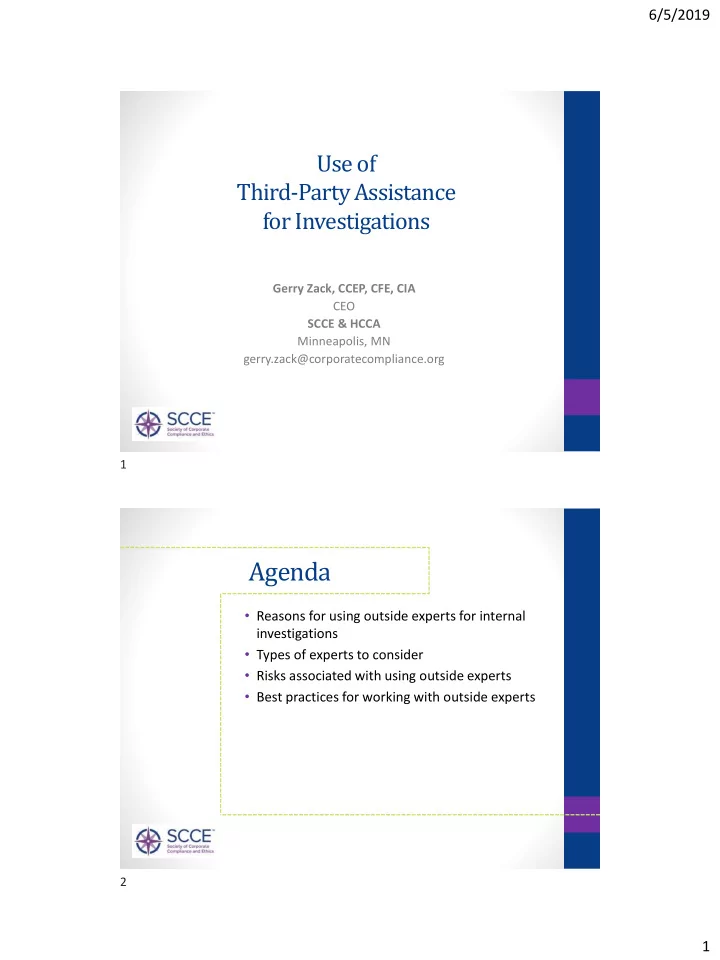

6/5/2019 Use of Third-Party Assistance for Investigations Gerry Zack, CCEP, CFE, CIA CEO SCCE & HCCA Minneapolis, MN gerry.zack@corporatecompliance.org 1 Agenda • Reasons for using outside experts for internal investigations • Types of experts to consider • Risks associated with using outside experts • Best practices for working with outside experts 2 1
6/5/2019 When/Why Use Third Parties? 1. Independence 2. Specialized expertise 3. Capacity or geographic reach 3 When/Why Use Third Parties? • Independence • For example, certain investigations of C-level execs, board members, etc • Relationships – family, financial, etc • Past history with subject/department • Appearance/reputation also matters, not just independence in fact • Certain critical/public investigations • However, make sure the third party is independent • In larger organizations and larger third party firms, this isn’t always obvious • Independence checks should be performed 4 2
6/5/2019 When/Why Use Third Parties? • Specialized expertise • eDiscovery • Data extraction and analytics • Case management • Interviewing • Subject matter expertise (e.g. accounting fraud, ) 5 When/Why Use Third Parties? • Capacity or geographic reach • We have talented people, but not enough time • Remote location, impractical for us to investigate 6 3
6/5/2019 Policy Consideration • Among the policies that should be in place pertaining to investigations, the issue of when to use third parties should be included • Authority to hire third parties • Under which circumstances 7 Group Discussion (1) • Your organization has decided to utilize third parties to assist with an investigation triggered by a whistleblower call on your hotline. You have determined that three outside parties will be hired: • Forensic accountant • An eDiscovery specialist (record collection and organization) • A technical subject mater expert (one of the allegation concerns whether a product you company billed the government for met the technical specifications in the contract) • You have also decided that due to the sensitive and potentially material nature of the investigation, external legal counsel will be retained 8 4
6/5/2019 Group Discussion (2) • What risks are created by using this team of external parties in conducting your internal investigation? 9 Understanding the Goals • What are the goals of the investigation? • Determine who did it? • Determine how they did it? • Determine damages? • Terminate guilty employees? • Take legal action to recover? • Criminal charges? • Minimize organizational liability? • This may drive some of the decisions surrounding the use of outside experts 10 5
6/5/2019 Outside Experts – Two Types • Consulting experts • Testifying experts • Subject to U.S. Federal Rule of Evidence 702 and Daubert challenge - A witness who is qualified as an expert by knowledge, skill, experience, training, or education may testify in the form of an opinion or otherwise if: a) The expert’s scientific, technical, or other specialized knowledge will help the trier of fact to understand the evidence or to determine a fact in issue; b) The testimony is based on sufficient facts or data; c) The testimony is the product of reliable principles and methods; and d) The expert has reliably applied the principles and methods to the facts of the case 11 Using Third Parties – Engagement Phase • Key issues before engaging: • Background check • Firm • Individuals working on your engagement • Clarification of scope • Fee structure (fixed price, hourly, etc) • Engagement letter, proposal, standards 12 6
6/5/2019 Third Parties & Privilege • Use of third party consultants, retained by legal counsel, reinforces privileged status of investigation • Underscores that investigation not a routine business function • Facilitates legal counsel control of third parties’ work product • Controls distribution of third parties’ work product to protect privileged information 13 Privilege Issues with Third Parties • Keeping legal counsel “in the loop” with third party consultants • Risk of waiving privileges when third party consultants communicate exclusively with non-lawyers • Third party consultants using subcontractors 14 7
6/5/2019 Using Third Parties – Work Phase • How should you deal with each of the following key issues? • Introduction, integrating into the “team” • Supervision of third party contractors • Responsibility for their work product • Third parties communicating with third parties • Managing the investigation • Scope creep • Reports from outside experts • Closeout of engagement 15 QUESTIONS ?? Gerry Zack, CCEP, CFE, CIA CEO SCCE & HCCA Tel: +1 952.567.6215 gerry.zack@corporatecompliance.org 16 8
Recommend
More recommend